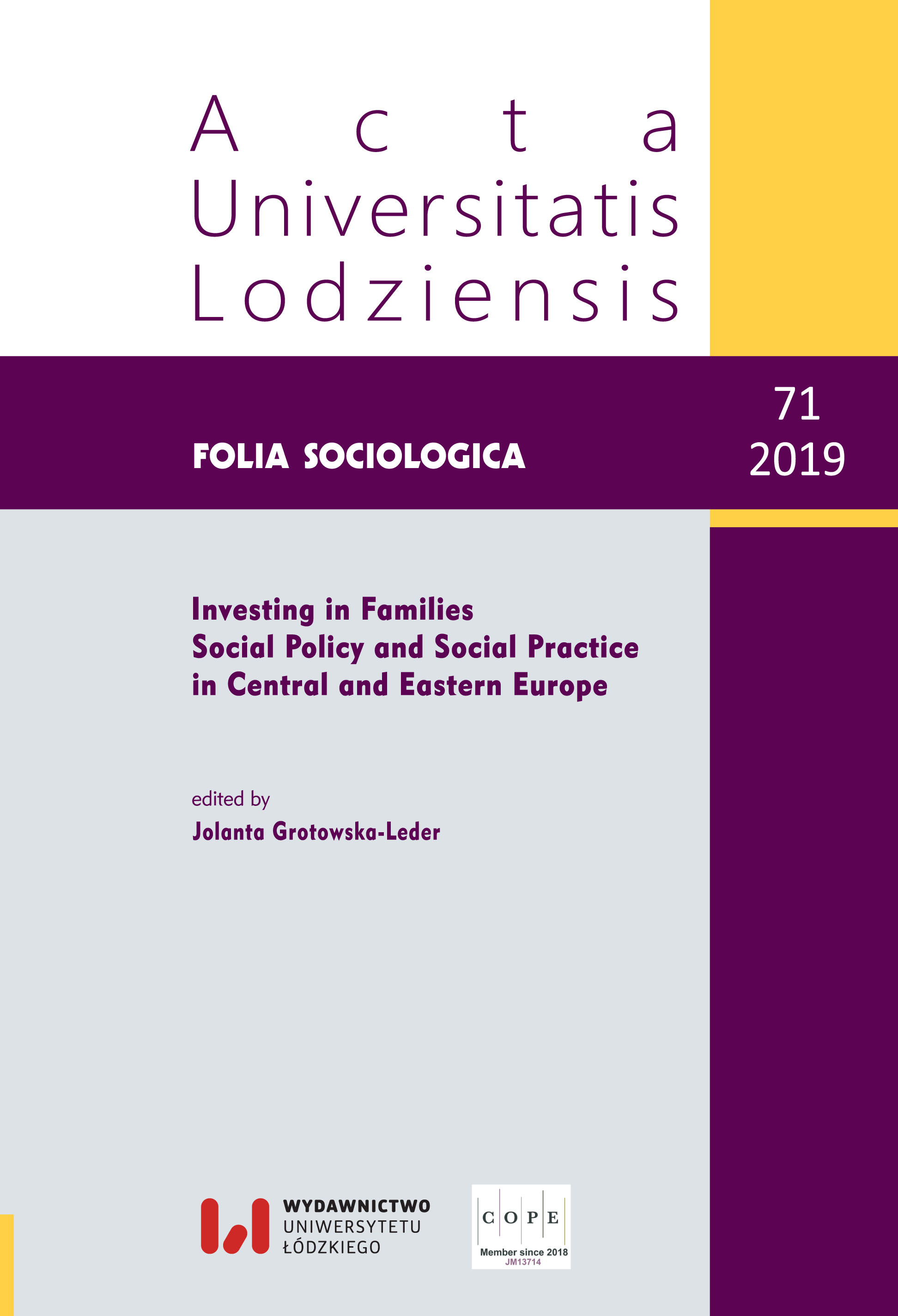Long-term care system for dependent people – Austrian experiences
DOI:
https://doi.org/10.18778/0208-600X.71.07Keywords:
dependent people, long-term care, older people, social assistance, social security system, principle of subsidiarityAbstract
Austrian society is an ageing society. Old age does not always mean dependence. However, the risk of disability and dependence increases with age. In addition, older people often experience multi-disease. High-quality long-term care services can help frail and dependent elderly on maintaining greater autonomy and participation in society, regardless of their condition. The aim of the article is to analyze legal, institutional and practical solutions in the field of long-term care system functioning in Austria. It should be emphasized that Austria is striving to develop services based on a social model and an independent life paradigm. Analysis of legal solutions indicates that the long-term care system in Austria is very complex. Institutional solutions are divided between the federal level and nine federal states. On the one hand, this results in decentralization and more effective help for the elderly, but on the other hand, it causes the diffusion and heterogeneity of standards.
References
Bundesgesetz, mit dem ein Pflegegeld eingeführt wird (Bundespflegegeldgesetz — BPGG), StF: BGBl. Nr. 110/1993 (NR: GP XVIII RV 776 AB 908 S. 100. BR: AB 4442 S. 564.), Verordnung der Bundesministerin für Arbeit, Gesundheit und Soziales über die Beurteilung des Pflegebedarfes nach dem Bundespflegegeldgesetz (Einstufungsverordnung zum Bundespflegegeldgesetz – EinstV), StF: BGBl. II Nr. 37/1999,Vereinbarung zwischen dem Bund und den Ländern gemäß über gemeinsame Maßnahmen des Bundes und der Länder für pflegebedürftige Personen
Google Scholar
Badelt C., Holzmann-Jenkins A., Matul C., Österle A. (1997), Analyse der Auswirkungen des Pflegevorsorgesystems, Bundesministrium für Arbeit, Gesundheit und Soziales, Wien.
Google Scholar
Błędowski P., Szatur-Jaworska B., Szweda-Lewandowska Z., Kubicki P. (2012), Raport na temat sytuacji osób starszych w Polsce, Instytut Pracy i Spraw Socjalnych, Warszawa.
Google Scholar
Da Roit B., Le Bihan B. (2010), Similar and Yet So Different: Cash-for-care in six European countries’ long-term care policies, “The Milbank Quarterly. A Multidisciplinary Journal of Population Healtha and Health Policy”, no. 88(3), pp. 286–309.
Google Scholar
Da Roit B., Le Bihan B., Österle A. (2008), Long-Term Care Policies in Italy, Austria and France: Variations in cash-for-care schemes, [in:] B. Palier, C. Martin (eds.), Reforming the Bismarckian Welfare Systems, Blackwell, Maden–Oxford–Carlton.
Google Scholar
EUROSTAT, Metadata: Healthy life years (from 2004 onwards) (hlth_hlye), retrieved from: https://ec.europa.eu/eurostat/cache/metadata/en/hlth_hlye_esms.htm (accessed 16.07.2019).
Google Scholar
GUS (2014), Prognoza ludności na lata 2014–2050, Zakład Wydawnictw Statystycznych, Warszawa.
Google Scholar
Luty-Michalak M. (2009), Przyszłość Polityki ludnościowej w kontekście starzenia się społeczeństwa polskiego, [in:] M. Krzysztofik, D. Gauza (eds.), Politologia jako nauka? Analiza politologiczna wobec kwestii współczesnego świata, MAJUS s.c., Zielona Góra, pp. 171–183.
Google Scholar
Luty-Michalak M. (2010), Więź międzypokoleniowa w starzejącym się społeczeństwie polskim. Czy jesteśmy świadkami prefiguratywności kulturowego przekazu międzypokoleniowego?, [in:] E. Rekłajtis, R. Wiśniewski, J. Zdanowski (eds.), Jedność i różnorodność. Kultura vs. kultury, Oficyna Wydawnicza ASPRA-JR, Warszawa, pp. 417–430.
Google Scholar
Luty-Michalak M. (2017), „Sandwich generation” – pokolenie kobiet podwójnie obciążonych obowiązkami opiekuńczymi, [in:] B. Szluz (ed.), Obraz współczesnej rodziny. Teoria i badania, Wydawnictwo Uniwersytetu Rzeszowskiego, Rzeszów, pp. 2111–2220.
Google Scholar
Riedel M., Kraus M. (2010), Care System for the Elderly in Austria, “SSRN Electronic Journal”, pp. 1–37.
Google Scholar
Szukalski P. (2014), Ludzie bardzo starzy – niewidoczna grupa docelowa polityki społecznej?, “Studia Demograficzne”, no. 2(166), pp. 57–78.
Google Scholar
Szukalski P. (2015), Najstarsi Polacy, “Demografia i Gerontologia Społeczna. Biuletyn Informacyjny”, vol. 1, pp. 1–4.
Google Scholar
Szweda-Lewandowska Z. (2014a), Modele opieki nad osobami niesamodzielnymi, “Studia Ekonomiczne. Zeszyty Naukowe Uniwersytetu Ekonomicznego w Katowicach”, no. 179, pp. 215–224.
Google Scholar
Szweda-Lewandowska Z. (2014b), Rynek usług opiekuńczych – perspektywy rozwoju w kontekście starzenia się populacji, “Optimum. Studia Ekonomiczne”, no. 2(68), pp. 148–157.
Google Scholar
Winzer B., Skalska A., Klich-Rączka A., Piotrowicz K., Grodzicki T. (2012), Ocena stanu funkcjonalnego u osób w starszym wieku, [in:] M. Mossakowska, A. Więcek, P. Błędowski (eds.), Aspekty medyczne, psychologiczne, socjologiczne i ekonomiczne starzenia się ludzi w Polsce, Termedia Wydawnictwa Medyczne, Poznań, pp. 81–94.
Google Scholar










